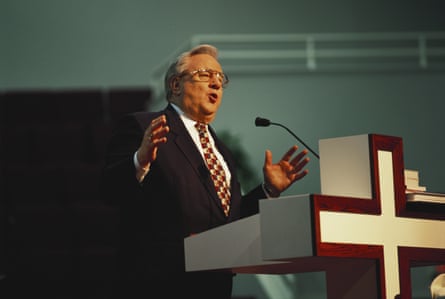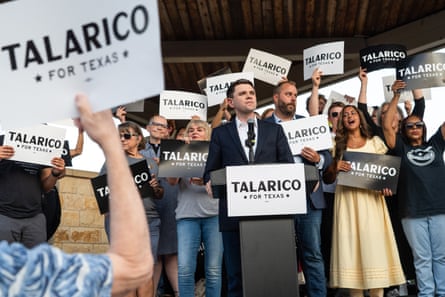He grew up on a farm in Indiana, the son of a factory worker and eldest of five children. He studied at Liberty, a Christian university founded by the conservative pastor and televangelist Jerry Falwell, and recalls wearing a T-shirt expressing opposition to Democratic presidential candidate John Kerry.
Two decades later, Justin Douglas is running for the US Congress – as a Democrat.
He is among around 30 Christian white clergy – pastors, seminary students and other faith leaders – known to be potential Democratic candidates in next year’s midterm elections, including a dozen who are already in the race. While stressing the separation of church and state, many say that on a personal level their faith is calling them into the political arena.
The trend marks a break from a traditional racial divide. Whereas Black pastors who run for office are typically Democrats, their white counterparts are usually Republicans, reflecting the strength of the religious right and the party’s dominance among evangelical voters.
Douglas, 41, based in Harrisburg, Pennsylvania, is among a new generation of the Christian left aiming to change that narrative by ensuring that the Democratic brand is not associated with only college-educated urbanites, but can also connect with white working class churchgoers.
“We’ve seen Democrats time and time again sell out working class people and we’ve seen Democrats time and time again look like liberal elitists who are looking down on people who think going to church on Sunday is a core part of their life,” said Douglas, who has been in ministry for more than 20 years. “Some people might feel judged for that.
“But I also think the stereotypes of Republicans being pro-faith are bullshit too. We’re seeing a current administration bastardise faith almost every day. They used the Lord’s Prayer in a propaganda video for what they’re now calling the Department of War. That should have had every single evangelical’s bells and whistles and alarms going off in their head: this is sacrilegious.
“But unfortunately sometimes when you’re in it you can’t see it and it takes somebody who has an ability to communicate to that audience, to help show that you’re being manipulated.”
For decades, many white Christians were not partisan and often voted Democratic, especially in the south. But by the late 1960s and early 1970s, the Democratic party’s identity was shifting toward civil rights, feminism and secular liberalism. Many white conservative Christians felt increasingly alienated from the party they had long inhabited.
The racial divide can in part be traced to the mid-1970s when the Internal Revenue Service began removing tax-exempt status from private schools that discriminated by race. Conservative Christian leaders such as Jerry Falwell saw this as federal overreach and seized on abortion as an issue that could be framed in religious and political terms.
Falwell’s organisation The Moral Majority used abortion as a broader symbol of moral decline alongside feminism, sex education and gay rights. His followers then felt betrayed when Jimmy Carter, the first evangelical Christian to occupy the White House, failed to pursue their priorities.

They defected to Republican Ronald Reagan and, by the end of the 1980s, white evangelicals had become one of the most consistently Republican voting blocs, even as Black churchgoers remained loyal to Democrats. That has persisted over the past decade under Donald Trump, seen by critics as vulgar and unchristian but by supporters as a blunt instrument to defend a church under siege by a godless liberal culture.
Whereas Carter earned 60% of the white evangelical vote in 1976, fellow Democrat Hillary Clinton gained only a 16% share in 2016. It was a troubling realignment that caught the eye of Doug Pagitt, a pastor and executive director of the progressive Christian group Vote Common Good.
He said: “That’s not natural. That’s not just a policy change. There was something more significant going on. It’s been a two sided effort. Republicans have oriented themselves primarily around religious voter identity and Democrats have set aside religious voter identity, including the fact that in 1992 Democrats removed from the voter access file the category of religious identity.”
Pagitt said Charlie Kirk’s organisation Turning Point USA was vital in turning out young Christian voters for Trump last year. “The difference couldn’t be more stark, which is why white clergy running for office is such a big deal when they’re running as Democrats in Iowa, in Arkansas, in Pennsylvania, in California.”
Trump’s first election was the trigger for a new wave of white clergy to overcome fears of being seen as partisan and run for elected office. Pagitt added: “After 2016 and 2018, a whole lot of people started thinking: ‘Hey, maybe running for office is something we should actually do.’
“Few people are surprised when Raphael Warnock says, ‘I’m a working pastor at Ebenezer Baptist church.’ He comes from the Martin Luther King tradition, from that pulpit, and it made sense: people are like, ‘Yeah, of course a Black clergyman’s going to run as a Democrat.’ But when a white woman pastor in Iowa says, ‘I’m going to run as a Democrat,’ it’s a real statement. It’s taken some of these people a little while to get comfortable with the fact that they are going to be partisan.”
Vote Common Good was founded in response to a schism created by the election of Trump, which left many religious people feeling “politically homeless”. The group operates as a “dating service”, connecting these voters with Democrats and non-Maga Republicans. The group will spend time in 50 congressional districts this year helping candidates meet faith voters and leaders in their districts.
Douglas is a county commissioner looking to unseat Republican Scott Perry in Pennsylvania’s 10th district. But he was previously the lead pastor of a growing church that allowed LGBTQ+ individuals to participate fully in its community; over the course of a year this developed into a huge bone of contention and in 2019 Douglas eventually lost his licence. He had to find a new house and go from one job to three jobs including driving an Uber and CrossFit coaching. He started a new church that is still operating today.
Douglas recalls: “I paid the price for standing with the LGBTQ+ people. I would do it again. It taught me that doing what’s right is often costly but always necessary, and everyone deserves to be safe, respected and fully included. That’s not a religious belief. It’s a human belief that I have.”
James Talarico, a Texas state representative and a 36-year-old part-time seminary student who has amassed a sizable social-media following – has become an unlikely standard-bearer in the Democrats’ 2026 Senate primary.
In a series of social media posts, he deploys scripture to champion the poor and vulnerable while castigating Republicans for what he casts as their drift towards Christian nationalism and corporate interests. He asked in one: “Instead of posting the Ten Commandments in every classroom, why don’t they post, ‘Money is the root of all evil’ in every boardroom?”

In Iowa, state representative Sarah Trone Garriott, an Evangelical Lutheran pastor, is seeking her party’s nod to challenge Republican incumbent Zach Nunn in what is already billed as one of the nation’s marquee congressional races.
In Arkansas, Robb Ryerse, a Christian pastor and former Republican, is mounting a challenge to congressman Steve Womack, adopting the slogan “Faith, Family & Freedom” – rhetoric more commonly found in Republican campaign literature.
Ryerse, 50, from Springdale, Arkansas, said: “I joke sometimes that the two people who have changed my life more than any others are Jesus and Donald Trump, for very different reasons. Donald Trump is absolutely inconsistent with Christian principles of love and compassion, justice, looking out for the poor, meeting the needs of the marginalised.
“But Donald Trump has also used and been used by so many evangelical leaders who want political power. He has used them to validate him to their followers and they have used him to further their agenda, which has been a Christian nationalist culture war on the United States, which I think is bad for both the church and for the country.”
White clergy are deciding to run for office, Ryerse believes, in part as a response to the rise of Christian nationalism and the reality that, according to a Public Religion Research Institute (PRRI) survey, Trump won 85% of the white evangelical vote in last year’s presidential election.
Ryerse said: “We realise hey, our churches and the people in our churches have been duped by this guy and so rather than hope someone else will clean up the problem, what we’ve seen is a lot of pastors respond with, you know what, I’m going to jump in and I’m going to be a part of the solution.
“On a more positive note, there’s also that notion we need to do something for the common good. There’s so much alignment between what I believe personally is good for my neighbour, what it means to love my neighbour, and how that aligns with what public policy ought to be.”

 German (DE)
German (DE)  English (US)
English (US)  Spanish (ES)
Spanish (ES)  French (FR)
French (FR)  Hindi (IN)
Hindi (IN)  Italian (IT)
Italian (IT)  Russian (RU)
Russian (RU)  3 weeks ago
3 weeks ago
























Comments